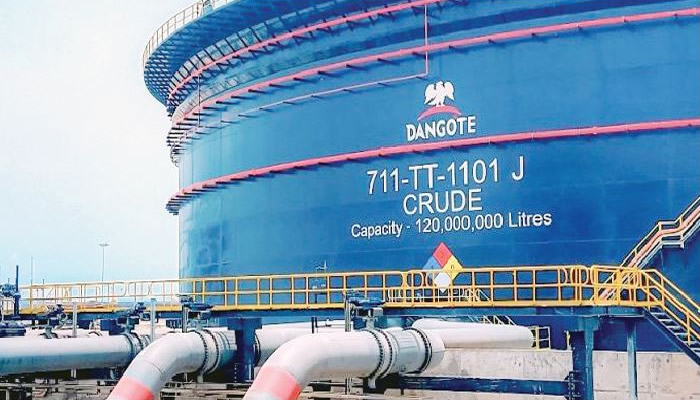The Dangote Petroleum Refinery has ramped up its crude oil processing capacity to 610,000 barrels per day (bpd), bringing the facility closer to its full operational potential and signaling a major step toward energy self-sufficiency in Nigeria. Industry officials and analysts have described the development as a significant boost to the nation’s refining capabilities, reducing dependence on imported petroleum products and strengthening foreign exchange reserves.
According to executives at the Dangote Group, the refinery’s expansion in output is the result of sustained investment in state-of-the-art technology and a phased commissioning process that began earlier in the year. The facility, located in the Lekki Free Zone in Lagos State, is designed to refine up to 650,000bpd when fully operational, making it the largest single-train refinery in the world.

Company sources confirmed that recent operational improvements and increased crude oil supply from both domestic and international sources have enabled the refinery to reach its current production milestone. With further optimization and calibration of equipment, the refinery is expected to achieve full capacity in the coming months.
Industry observers note that the expansion will have far-reaching economic implications, particularly in reducing Nigeria’s longstanding dependence on imported refined petroleum products, which has historically strained the country’s foreign exchange reserves. By supplying more petrol, diesel, and aviation fuel domestically, the refinery is expected to lower import bills and enhance energy security.
Market analysts also believe the increased output could help stabilize fuel prices and address supply bottlenecks that have often led to scarcity and price volatility in the downstream oil sector. With Nigeria’s growing population and energy needs, the refinery’s near-full operation is seen as a timely intervention to meet domestic demand while providing surplus products for export.
The refinery’s management expressed confidence that the project aligns with President Bola Tinubu’s economic agenda, which emphasizes industrial growth, infrastructure development, and increased private-sector participation in the oil and gas industry. They highlighted that the refinery is also creating thousands of direct and indirect jobs, boosting ancillary industries such as transportation, storage, and logistics.
Industry experts argue that the refinery’s success could encourage more private-sector investments in the energy sector, complementing efforts by the Nigerian National Petroleum Company Limited (NNPCL) to rehabilitate its own refineries. The synergy between public and private initiatives, they note, could transform Nigeria into a refining hub for the West African region.
Despite the positive momentum, challenges remain, particularly around crude oil supply logistics and infrastructure bottlenecks that have occasionally slowed operations. Dangote Group executives confirmed ongoing collaboration with the federal government and upstream producers to ensure a steady flow of feedstock to sustain production growth.
Energy sector stakeholders have welcomed the development, stressing that it presents an opportunity for Nigeria to leverage its natural resources more effectively. They called for continued regulatory support and policies that encourage private-sector players to invest in refining, petrochemicals, and renewable energy, which could further diversify the economy.
With output now at 610,000bpd, expectations are high that the refinery will soon reach its designed 650,000bpd capacity, providing a steady supply of refined products for both domestic use and export markets. Analysts predict that once full capacity is achieved, Nigeria could not only meet its own fuel needs but also become a major exporter to neighboring countries, strengthening its trade balance.
As the facility nears this milestone, attention will be on how the increased production impacts local fuel prices, government subsidy policies, and the broader economy. For many Nigerians, the hope is that the refinery’s success will translate into tangible relief at the pump and sustainable growth for the energy sector.
The Dangote Refinery’s progress underscores the importance of strategic private-sector investments in critical infrastructure. As it edges toward maximum capacity, its impact is expected to resonate across various sectors, positioning Nigeria as a key refining hub in Africa.
Observers believe that sustained collaboration between the refinery, government agencies, and upstream producers will be crucial in maintaining production stability and achieving the long-term economic benefits envisioned by the project’s promoters.
Support InfoStride News' Credible Journalism: Only credible journalism can guarantee a fair, accountable and transparent society, including democracy and government. It involves a lot of efforts and money. We need your support. Click here to Donate
